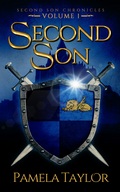 I have no expectations, for I am a second son and so my prospects are limited. Moreover, I am a second son of a second son, making me twice removed from the advantages of inheritance.
I have no expectations, for I am a second son and so my prospects are limited. Moreover, I am a second son of a second son, making me twice removed from the advantages of inheritance.
It is usual in our society that second sons are destined for the Church. There, a man who is ambitious and clever – and lucky – and also, perhaps, a bit ruthless – may rise to positions of comfort and power. Those of a more meek and selfless bent may be drawn to a life of service to others. But for many, it is a destiny of rules and deprivation and toil, and a life with little joy or satisfaction.
I am to be spared that fate, however, for our family is not usual. My grandfather is the king, and even second sons are important to ensuring the succession. So my destiny is to be always “in waiting” and to try to find a role for myself during a wait that could last my entire lifetime. In that, I am not unlike my father, though he is nearer the succession than I.

The last thing I remember before the world went dark was watching my arrow find its mark, saving my uncle from almost certain death. And the look – seemingly of recognition – on my victim’s face as he turned toward me in his final agony. And the distant thunder of hoof beats – a troop of knights rushing to our rescue. A rescue that may have come too late for me.
I regain my senses to find myself draped across the shoulders of a horse, its rider in the saddle behind me. I decide to keep my return to consciousness secret for the moment, in hope of learning something about my situation. What I can see from this position, without turning my head or betraying my wakefulness, is limited. We’re not on an open track or main road. From the abundance of leaves and underbrush beneath the horse’s feet, I deduce we’re in some kind of wood. Presumably, the rider wishes to remain unseen and undiscovered. There’s a gentle undulation to the land as we move forward. A sign that we’re skirting the edge of low hills? There’s no way to determine our direction of travel, as the shade blocks any indication of the position of the sun. I detect no other horses nearby and no sound beyond what’s made by our own horse, so we must be traveling alone.
My head aches dreadfully from the blow, the pain made even worse by my position, which causes the blood to flow to my head. My hands and feet are bound and tied together beneath the horse’s chest. Though this may only be a precaution to keep me from falling off should the rider need to move swiftly, it seems more likely an indication that the rider is my captor and not my savior. Deciding there’s nothing more I can learn from where I am, I stir visibly and turn my head to try to look up at the rider.
“You wake at last. I was beginning to think I’d done more damage than what I intended.” He says nothing more . . . just rides on in silence. I, too, remain silent, not wishing to give him any indication of fear or desperation.
The bones of the horse’s withers press into my belly as he walks – right, left, right, left – adding to my misery. After what seems like an eternity but is probably no more than a quarter of an hour, I ask, “Who are you? Where are we going?”
There’s no reply. And there is now no doubt . . . this man is clearly my captor.
We ride on until the shade deepens even more, night beginning to fall. The sound of running water must be a stream nearby. We stop. He dismounts, slings me over his shoulder, and takes me to a tree. He seats me facing the tree, then releases and reties the bindings on my hands so that I’m hugging its trunk. Then he does the same with my feet. He has no intention that I should escape.
He unsaddles his horse, hobbles it, and sets it to forage for something to eat under the leaves. Then he disappears. Returning with a flask and a cup, he pours water into the cup and holds it for me to drink. I had no idea I was so thirsty, but the water is sweet and I gulp it down, hoping for more.
He retrieves a loaf of bread from his pack, tears off a chunk, and holds it for me to eat. Then he pours another cup of water. While he’s pouring, I ask again, “Who are you?”
This time he answers. “I know who you are. That’s all that matters.”


